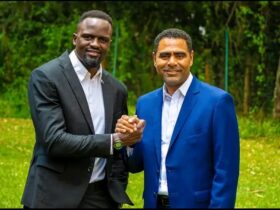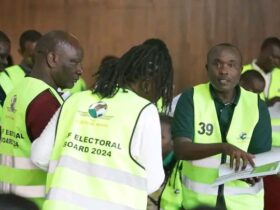The Football Kenya Federation (FKF) presidential debate offered a mix of bold promises, controversial moments, and striking absences. With Extreme Sports CEO Hussein Mohammed, former FKF President Sam Nyamweya, and FKF Deputy President Dorris Petra missing, the stage was set for an engaging exchange among remaining 6 candidates.
Key figures like former Harambee Stars player Samy Owino, Ligi Ndogo founder Chris Amimo, Kakamega Homeboyz chairman Cleophas Shimanyula, businessman Tom Alila, outgoing FKF CEO Barry Otieno and Gor Mahia Secretary General Sam Ochola seized the opportunity to outline their visions for the future of Kenyan football.
Sam Ochola set the tone by calling for a clean slate, advocating for new leadership within FKF’s administration, which he argued was crucial to restoring faith in the organization. “Let everyone who has been in the FKF administration go home—the likes of Barry Otieno and Amimo,” Ochola remarked, his stance reflecting a broader sentiment about leadership overhaul.
Cleophas Shimanyula, also known as ‘Toto,’ emphasized the importance of grassroots football, vowing to establish ten teams in each sub-county to bolster youth engagement and create employment opportunities. “This approach will not only promote football but also create jobs for the youth,” he said. Shimanyula’s vision extended to partnering with government officials to improve county infrastructure and integrate secondary schools into FKF, providing scholarships to talented footballers.
Chris Amimo highlighted the need to revitalize youth programs, proposing a technical center and the return of Under-13 leagues as pathways to scout and nurture young talent. “This will help us tap into young talents,” he shared, aiming to strengthen football at its foundation. Amimo’s plan also involved training teachers to identify and develop players at an early age, setting up a more sustainable system for the sport.
Tom Alila raised an issue that sent waves through the debate: the conflict of interest where national team coaches serve as player agents. He specifically called out a recent transfer involving Benson Omala, warning that these conflicts undermine professionalism. “It’s sad that our head coach was involved in the transfer of Benson Omala…this needs to change,” Alila stated, pressing for greater separation between coaching and player management.
Outgoing FKF CEO Barry Otieno defended the federation’s financial practices amid growing scrutiny, explaining that FIFA funds were allocated for salaries and expenses and were impacted by Kenya’s suspension from FIFA. “We did bad business on the OB Van, and I’ve learned from it,” Otieno admitted, acknowledging past mistakes. He further emphasized the importance of creating a pathway to professionalism, asserting that training alone won’t suffice without viable local leagues for young players to progress.
With each candidate bringing their own approach, the debate underscored both the potential and the challenges of the federation’s future. Charles Gacheru, Tusker Chairman, reminded everyone that FKF’s future extends beyond individual leaders, insisting, “FKF isn’t just about elected leaders like Barry or Nick; it’s about everyone who contributes to the game.”
While the candidates laid out distinct paths forward—from grassroots development to transparency and integrity—the future of FKF remains fraught with obstacles. Yet the debate has made one thing clear: Kenyan football’s next chapter will demand both innovation and accountability. The election is looming, and so are the hopes of a nation waiting for meaningful change.










Leave a Reply